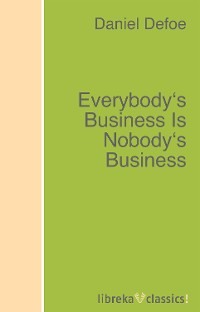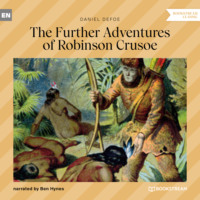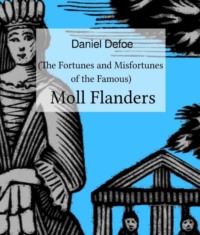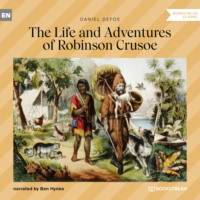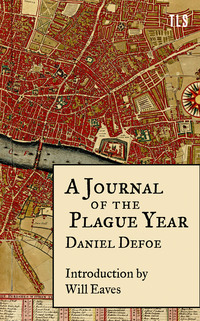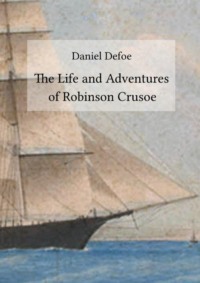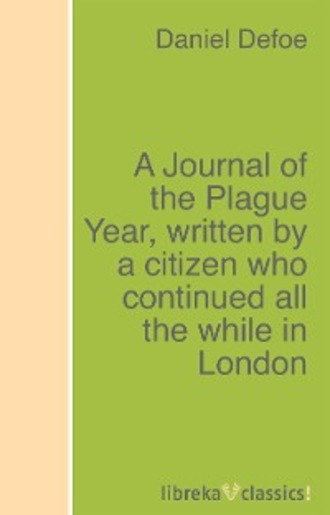
Полная версия
A Journal of the Plague Year, written by a citizen who continued all the while in London
I looked earnestly every way, and at the very moment that this man directed, but could not see the least appearance of anything; but so positive was this poor man, that he gave the people the vapours in abundance, and sent them away trembling and frighted, till at length few people that knew of it cared to go through that passage, and hardly anybody by night on any account whatever.
This ghost, as the poor man affirmed, made signs to the houses, and to the ground, and to the people, plainly intimating, or else they so understanding it, that abundance of the people should come to be buried in that churchyard, as indeed happened; but that he saw such aspects I must acknowledge I never believed, nor could I see anything of it myself, though I looked most earnestly to see it, if possible.
These things serve to show how far the people were really overcome with delusions; and as they had a notion of the approach of a visitation, all their predictions ran upon a most dreadful plague, which should lay the whole city, and even the kingdom, waste, and should destroy almost all the nation, both man and beast.
To this, as I said before, the astrologers added stories of the conjunctions of planets in a malignant manner and with a mischievous influence, one of which conjunctions was to happen, and did happen, in October, and the other in November; and they filled the people's heads with predictions on these signs of the heavens, intimating that those conjunctions foretold drought, famine, and pestilence. In the two first of them, however, they were entirely mistaken, for we had no droughty season, but in the beginning of the year a hard frost, which lasted from December almost to March, and after that moderate weather, rather warm than hot, with refreshing winds, and, in short, very seasonable weather, and also several very great rains.
Some endeavours were used to suppress the printing of such books as terrified the people, and to frighten the dispersers of them, some of whom were taken up; but nothing was done in it, as I am informed, the Government being unwilling to exasperate the people, who were, as I may say, all out of their wits already.
Neither can I acquit those ministers that in their sermons rather sank than lifted up the hearts of their hearers. Many of them no doubt did it for the strengthening the resolution of the people, and especially for quickening them to repentance, but it certainly answered not their end, at least not in proportion to the injury it did another way; and indeed, as God Himself through the whole Scriptures rather draws to Him by invitations and calls to turn to Him and live, than drives us by terror and amazement, so I must confess I thought the ministers should have done also, imitating our blessed Lord and Master in this, that His whole Gospel is full of declarations from heaven of God's mercy, and His readiness to receive penitents and forgive them, complaining, 'Ye will not come unto Me that ye may have life', and that therefore His Gospel is called the Gospel of Peace and the Gospel of Grace.
But we had some good men, and that of all persuasions and opinions, whose discourses were full of terror, who spoke nothing but dismal things; and as they brought the people together with a kind of horror, sent them away in tears, prophesying nothing but evil tidings, terrifying the people with the apprehensions of being utterly destroyed, not guiding them, at least not enough, to cry to heaven for mercy.
It was, indeed, a time of very unhappy breaches among us in matters of religion. Innumerable sects and divisions and separate opinions prevailed among the people. The Church of England was restored, indeed, with the restoration of the monarchy, about four years before; but the ministers and preachers of the Presbyterians and Independents, and of all the other sorts of professions, had begun to gather separate societies and erect altar against altar, and all those had their meetings for worship apart, as they have now, but not so many then, the Dissenters being not thoroughly formed into a body as they are since; and those congregations which were thus gathered together were yet but few. And even those that were, the Government did not allow, but endeavoured to suppress them and shut up their meetings.
But the visitation reconciled them again, at least for a time, and many of the best and most valuable ministers and preachers of the Dissenters were suffered to go into the churches where the incumbents were fled away, as many were, not being able to stand it; and the people flocked without distinction to hear them preach, not much inquiring who or what opinion they were of. But after the sickness was over, that spirit of charity abated; and every church being again supplied with their own ministers, or others presented where the minister was dead, things returned to their old channel again.
One mischief always introduces another. These terrors and apprehensions of the people led them into a thousand weak, foolish, and wicked things, which they wanted not a sort of people really wicked to encourage them to: and this was running about to fortune-tellers, cunning-men, and astrologers to know their fortune, or, as it is vulgarly expressed, to have their fortunes told them, their nativities calculated, and the like; and this folly presently made the town swarm with a wicked generation of pretenders to magic, to the black art, as they called it, and I know not what; nay, to a thousand worse dealings with the devil than they were really guilty of. And this trade grew so open and so generally practised that it became common to have signs and inscriptions set up at doors: 'Here lives a fortune-teller', 'Here lives an astrologer', 'Here you may have your nativity calculated', and the like; and Friar Bacon's brazen-head, which was the usual sign of these people's dwellings, was to be seen almost in every street, or else the sign of Mother Shipton, or of Merlin's head, and the like.
With what blind, absurd, and ridiculous stuff these oracles of the devil pleased and satisfied the people I really know not, but certain it is that innumerable attendants crowded about their doors every day. And if but a grave fellow in a velvet jacket, a band, and a black coat, which was the habit those quack-conjurers generally went in, was but seen in the streets the people would follow them in crowds, and ask them questions as they went along.
I need not mention what a horrid delusion this was, or what it tended to; but there was no remedy for it till the plague itself put an end to it all—and, I suppose, cleared the town of most of those calculators themselves. One mischief was, that if the poor people asked these mock astrologers whether there would be a plague or no, they all agreed in general to answer 'Yes', for that kept up their trade. And had the people not been kept in a fright about that, the wizards would presently have been rendered useless, and their craft had been at an end. But they always talked to them of such-and-such influences of the stars, of the conjunctions of such-and-such planets, which must necessarily bring sickness and distempers, and consequently the plague. And some had the assurance to tell them the plague was begun already, which was too true, though they that said so knew nothing of the matter.
The ministers, to do them justice, and preachers of most sorts that were serious and understanding persons, thundered against these and other wicked practices, and exposed the folly as well as the wickedness of them together, and the most sober and judicious people despised and abhorred them. But it was impossible to make any impression upon the middling people and the working labouring poor. Their fears were predominant over all their passions, and they threw away their money in a most distracted manner upon those whimsies. Maid-servants especially, and men-servants, were the chief of their customers, and their question generally was, after the first demand of 'Will there be a plague?' I say, the next question was, 'Oh, sir I for the Lord's sake, what will become of me? Will my mistress keep me, or will she turn me off? Will she stay here, or will she go into the country? And if she goes into the country, will she take me with her, or leave me here to be starved and undone?' And the like of menservants.
The truth is, the case of poor servants was very dismal, as I shall have occasion to mention again by-and-by, for it was apparent a prodigious number of them would be turned away, and it was so. And of them abundance perished, and particularly of those that these false prophets had flattered with hopes that they should be continued in their services, and carried with their masters and mistresses into the country; and had not public charity provided for these poor creatures, whose number was exceeding great and in all cases of this nature must be so, they would have been in the worst condition of any people in the city.
These things agitated the minds of the common people for many months, while the first apprehensions were upon them, and while the plague was not, as I may say, yet broken out. But I must also not forget that the more serious part of the inhabitants behaved after another manner. The Government encouraged their devotion, and appointed public prayers and days of fasting and humiliation, to make public confession of sin and implore the mercy of God to avert the dreadful judgement which hung over their heads; and it is not to be expressed with what alacrity the people of all persuasions embraced the occasion; how they flocked to the churches and meetings, and they were all so thronged that there was often no coming near, no, not to the very doors of the largest churches. Also there were daily prayers appointed morning and evening at several churches, and days of private praying at other places; at all which the people attended, I say, with an uncommon devotion. Several private families also, as well of one opinion as of another, kept family fasts, to which they admitted their near relations only. So that, in a word, those people who were really serious and religious applied themselves in a truly Christian manner to the proper work of repentance and humiliation, as a Christian people ought to do.
Again, the public showed that they would bear their share in these things; the very Court, which was then gay and luxurious, put on a face of just concern for the public danger. All the plays and interludes which, after the manner of the French Court, had been set up, and began to increase among us, were forbid to act; the gaming-tables, public dancing-rooms, and music-houses, which multiplied and began to debauch the manners of the people, were shut up and suppressed; and the jack-puddings, merry-andrews, puppet-shows, rope-dancers, and such-like doings, which had bewitched the poor common people, shut up their shops, finding indeed no trade; for the minds of the people were agitated with other things, and a kind of sadness and horror at these things sat upon the countenances even of the common people. Death was before their eyes, and everybody began to think of their graves, not of mirth and diversions.
But even those wholesome reflections—which, rightly managed, would have most happily led the people to fall upon their knees, make confession of their sins, and look up to their merciful Saviour for pardon, imploring His compassion on them in such a time of their distress, by which we might have been as a second Nineveh—had a quite contrary extreme in the common people, who, ignorant and stupid in their reflections as they were brutishly wicked and thoughtless before, were now led by their fright to extremes of folly; and, as I have said before, that they ran to conjurers and witches, and all sorts of deceivers, to know what should become of them (who fed their fears, and kept them always alarmed and awake on purpose to delude them and pick their pockets), so they were as mad upon their running after quacks and mountebanks, and every practising old woman, for medicines and remedies; storing themselves with such multitudes of pills, potions, and preservatives, as they were called, that they not only spent their money but even poisoned themselves beforehand for fear of the poison of the infection; and prepared their bodies for the plague, instead of preserving them against it. On the other hand it is incredible and scarce to be imagined, how the posts of houses and corners of streets were plastered over with doctors' bills and papers of ignorant fellows, quacking and tampering in physic, and inviting the people to come to them for remedies, which was generally set off with such flourishes as these, viz.: 'Infallible preventive pills against the plague.' 'Neverfailing preservatives against the infection.' 'Sovereign cordials against the corruption of the air.' 'Exact regulations for the conduct of the body in case of an infection.' 'Anti-pestilential pills.' 'Incomparable drink against the plague, never found out before.' 'An universal remedy for the plague.' 'The only true plague water.' 'The royal antidote against all kinds of infection';—and such a number more that I cannot reckon up; and if I could, would fill a book of themselves to set them down.
Others set up bills to summon people to their lodgings for directions and advice in the case of infection. These had specious titles also, such as these:—
'An eminent High Dutch physician, newly come over from Holland, where he resided during all the time of the great plague last year in Amsterdam, and cured multitudes of people that actually had the plague upon them.'
'An Italian gentlewoman just arrived from Naples, having a choice secret to prevent infection, which she found out by her great experience, and did wonderful cures with it in the late plague there, wherein there died 20,000 in one day.'
'An ancient gentlewoman, having practised with great success in the late plague in this city, anno 1636, gives her advice only to the female sex. To be spoken with,' &c.
'An experienced physician, who has long studied the doctrine of antidotes against all sorts of poison and infection, has, after forty years' practice, arrived to such skill as may, with God's blessing, direct persons how to prevent their being touched by any contagious distemper whatsoever. He directs the poor gratis.'
I take notice of these by way of specimen. I could give you two or three dozen of the like and yet have abundance left behind. 'Tis sufficient from these to apprise any one of the humour of those times, and how a set of thieves and pickpockets not only robbed and cheated the poor people of their money, but poisoned their bodies with odious and fatal preparations; some with mercury, and some with other things as bad, perfectly remote from the thing pretended to, and rather hurtful than serviceable to the body in case an infection followed.
I cannot omit a subtility of one of those quack operators, with which he gulled the poor people to crowd about him, but did nothing for them without money. He had, it seems, added to his bills, which he gave about the streets, this advertisement in capital letters, viz., 'He gives advice to the poor for nothing.'
Abundance of poor people came to him accordingly, to whom he made a great many fine speeches, examined them of the state of their health and of the constitution of their bodies, and told them many good things for them to do, which were of no great moment. But the issue and conclusion of all was, that he had a preparation which if they took such a quantity of every morning, he would pawn his life they should never have the plague; no, though they lived in the house with people that were infected. This made the people all resolve to have it; but then the price of that was so much, I think 'twas half-a-crown. 'But, sir,' says one poor woman, 'I am a poor almswoman and am kept by the parish, and your bills say you give the poor your help for nothing.' 'Ay, good woman,' says the doctor, 'so I do, as I published there. I give my advice to the poor for nothing, but not my physic.' 'Alas, sir!' says she, 'that is a snare laid for the poor, then; for you give them advice for nothing; that is to say, you advise them gratis, to buy your physic for their money; so does every shop-keeper with his wares.' Here the woman began to give him ill words, and stood at his door all that day, telling her tale to all the people that came, till the doctor finding she turned away his customers, was obliged to call her upstairs again, and give her his box of physic for nothing, which perhaps, too, was good for nothing when she had it.
But to return to the people, whose confusions fitted them to be imposed upon by all sorts of pretenders and by every mountebank. There is no doubt but these quacking sort of fellows raised great gains out of the miserable people, for we daily found the crowds that ran after them were infinitely greater, and their doors were more thronged than those of Dr Brooks, Dr Upton, Dr Hodges, Dr Berwick, or any, though the most famous men of the time. I And I was told that some of them got five pounds a day by their physic.
But there was still another madness beyond all this, which may serve to give an idea of the distracted humour of the poor people at that time: and this was their following a worse sort of deceivers than any of these; for these petty thieves only deluded them to pick their pockets and get their money, in which their wickedness, whatever it was, lay chiefly on the side of the deceivers, not upon the deceived. But in this part I am going to mention, it lay chiefly in the people deceived, or equally in both; and this was in wearing charms, philtres, exorcisms, amulets, and I know not what preparations, to fortify the body with them against the plague; as if the plague was not the hand of God, but a kind of possession of an evil spirit, and that it was to be kept off with crossings, signs of the zodiac, papers tied up with so many knots, and certain words or figures written on them, as particularly the word Abracadabra, formed in triangle or pyramid, thus:—
I might spend a great deal of time in my exclamations against the follies, and indeed the wickedness, of those things, in a time of such danger, in a matter of such consequences as this, of a national infection. But my memorandums of these things relate rather to take notice only of the fact, and mention only that it was so. How the poor people found the insufficiency of those things, and how many of them were afterwards carried away in the dead-carts and thrown into the common graves of every parish with these hellish charms and trumpery hanging about their necks, remains to be spoken of as we go along.
All this was the effect of the hurry the people were in, after the first notion of the plaque being at hand was among them, and which may be said to be from about Michaelmas 1664, but more particularly after the two men died in St Giles's in the beginning of December; and again, after another alarm in February. For when the plague evidently spread itself, they soon began to see the folly of trusting to those unperforming creatures who had gulled them of their money; and then their fears worked another way, namely, to amazement and stupidity, not knowing what course to take or what to do either to help or relieve themselves. But they ran about from one neighbour's house to another, and even in the streets from one door to another, with repeated cries of, 'Lord, have mercy upon us! What shall we do?'
Indeed, the poor people were to be pitied in one particular thing in which they had little or no relief, and which I desire to mention with a serious awe and reflection, which perhaps every one that reads this may not relish; namely, that whereas death now began not, as we may say, to hover over every one's head only, but to look into their houses and chambers and stare in their faces. Though there might be some stupidity and dulness of the mind (and there was so, a great deal), yet there was a great deal of just alarm sounded into the very inmost soul, if I may so say, of others. Many consciences were awakened; many hard hearts melted into tears; many a penitent confession was made of crimes long concealed. It would wound the soul of any Christian to have heard the dying groans of many a despairing creature, and none durst come near to comfort them. Many a robbery, many a murder, was then confessed aloud, and nobody surviving to record the accounts of it. People might be heard, even into the streets as we passed along, calling upon God for mercy through Jesus Christ, and saying, 'I have been a thief, 'I have been an adulterer', 'I have been a murderer', and the like, and none durst stop to make the least inquiry into such things or to administer comfort to the poor creatures that in the anguish both of soul and body thus cried out. Some of the ministers did visit the sick at first and for a little while, but it was not to be done. It would have been present death to have gone into some houses. The very buriers of the dead, who were the hardenedest creatures in town, were sometimes beaten back and so terrified that they durst not go into houses where the whole families were swept away together, and where the circumstances were more particularly horrible, as some were; but this was, indeed, at the first heat of the distemper.
Time inured them to it all, and they ventured everywhere afterwards without hesitation, as I shall have occasion to mention at large hereafter.
I am supposing now the plague to be begun, as I have said, and that the magistrates began to take the condition of the people into their serious consideration. What they did as to the regulation of the inhabitants and of infected families, I shall speak to by itself; but as to the affair of health, it is proper to mention it here that, having seen the foolish humour of the people in running after quacks and mountebanks, wizards and fortune-tellers, which they did as above, even to madness, the Lord Mayor, a very sober and religious gentleman, appointed physicians and surgeons for relief of the poor—I mean the diseased poor and in particular ordered the College of Physicians to publish directions for cheap remedies for the poor, in all the circumstances of the distemper. This, indeed, was one of the most charitable and judicious things that could be done at that time, for this drove the people from haunting the doors of every disperser of bills, and from taking down blindly and without consideration poison for physic and death instead of life.
This direction of the physicians was done by a consultation of the whole College; and, as it was particularly calculated for the use of the poor and for cheap medicines, it was made public, so that everybody might see it, and copies were given gratis to all that desired it. But as it is public, and to be seen on all occasions, I need not give the reader of this the trouble of it.
I shall not be supposed to lessen the authority or capacity of the physicians when I say that the violence of the distemper, when it came to its extremity, was like the fire the next year. The fire, which consumed what the plague could not touch, defied all the application of remedies; the fire-engines were broken, the buckets thrown away, and the power of man was baffled and brought to an end. So the Plague defied all medicines; the very physicians were seized with it, with their preservatives in their mouths; and men went about prescribing to others and telling them what to do till the tokens were upon them, and they dropped down dead, destroyed by that very enemy they directed others to oppose. This was the case of several physicians, even some of them the most eminent, and of several of the most skilful surgeons. Abundance of quacks too died, who had the folly to trust to their own medicines, which they must needs be conscious to themselves were good for nothing, and who rather ought, like other sorts of thieves, to have run away, sensible of their guilt, from the justice that they could not but expect should punish them as they knew they had deserved.
Not that it is any derogation from the labour or application of the physicians to say they fell in the common calamity; nor is it so intended by me; it rather is to their praise that they ventured their lives so far as even to lose them in the service of mankind. They endeavoured to do good, and to save the lives of others. But we were not to expect that the physicians could stop God's judgements, or prevent a distemper eminently armed from heaven from executing the errand it was sent about.


